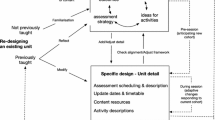Abstract
When designing units for instruction teachers must integrate information from several types of knowledge bases, for instance, information about subject specific pedagogy (pedagogical content knowledge), general pedagogy, the subject-matter (content knowledge), and learners (including their developmental level and prior knowledge). We at the University of Michigan have developed a unique approach to helping preservice teachers gain expertise in this activity. In addition to revising the courses the preservice teachers take (in elementary education), they use a computer-aided design tool, IByD (Instruction by Design) that supports them as they develop unit designs. This chapter focuses on a first experiment we conducted with IByD; 13 preservice teachers used IByD for one semester during an Educational Psychology course. We found that IByD users produced work which was more thorough than non-IByD users in developing their unit designs, and that IByD users were more systematic in how explicit and discrete they were when considering various instructional issues and applying them to activities. Further, we present evidence which suggests that novice teachers internalized and benefited from the scaffolding provided by the program, for instance, prompts in templates.
Access this chapter
Tax calculation will be finalised at checkout
Purchases are for personal use only
Preview
Unable to display preview. Download preview PDF.
Similar content being viewed by others
References
Berliner, D.C.: In pursuit of the expert pedagogue. Educational Researcher. September, 5–13 (1986)
Borko, H.: Research on learning to teach: Implications for graduate teacher preparation. In: Research perspectives on the graduate preparation of teachers. (A. Woolfolk, ed.). pp. 69–87. Engleweed Cliffs, NJ: Prentice Hall 1989
Clark, C.M., & Peterson, P.L.: Teacher’s thought processes. In: Handbook of research on teaching. 3rd ed. (M. Wittrock, ed.). pp. 255–296. New York: Mcmiilan 1986
Clark, K., & Yinger, R.: Teaching planning. In: Exploring teacher’s thinking. (J. Calderhead, ed.). pp. 84–103. London: Cassell 1987
Collins, A., & Brown, J.S.: The computer as a tool for learning through reflection. In: Learning issues for intelligent tutoring systems. (H. Mandl & A. Lesgold, eds.). pp. 1–18. New York: Springer Verlag 1986
Collins, A.: Cognitive apprenticeship and instructional technology. Cambridge, MA: BBN Laboratories Incorporated, Technical report #6899 (1988)
Collins, A., Brown, J.S., & Newman, S.E.: Cognitive apprenticeship: Teaching the craft of reading, writing, and mathematics. In: Cognition and instruction: Issues and Agendas. (L.B. Resnick, ed.). pp. 435494. Hillsdale, NJ: Lawrence Erlbaum 1986
Conover, W.J.: Non–parametric reference: Practical non-parametric statistics. 2nd ed. New York: John Wiley & Sons 1980
Guzdial, M., Soloway, E., Blumenfeld, P., Hohmann, L., Ewing, K., Tabak, I., Brade, K., & Kafai, Y.: The future of CAD: Technological support for kids building artifacts. In: Learning to desgin, designing to learn: Using technology to transform the curriculum. (D. Balestri, S. Ehnnann, & D. Ferguson eds.). Norwood, NJ: Ablex (in press)
Hawisher, G.E.: Research update: Writing and work processing. Computers and Composition. 5, (2), 7–27 (1988)
Huck S.W., Cormier, W.H., & Bounds, W.G., Jr.,: Reading statistics and research. New York: Harper & Row 1974
Kozma, R.B.: The impact of computer-based tools and embedded prompts on writing processes and products of novice and advanced college writers. Cognition and Instruction (accepted)
Krendl, K.A., & Lieberman, D.A.: Computers and learning: a review of recent research. Journal of Educational Computing Research. 4, (4), 367–389 (1988)
Marascuilo, L.A., & Serlin, R.: Statistical methods for the social and behavioral sciences. New York: W.H. Freeman & Company 1988
Mestre, J.P.: Promoting expert-like behavior among beginning physics students. National Science Foundation, Technical report #143 (1988)
Scardamalia, M., & Bereiter, C.: Higher levels of agency for children in knowledge building: A challenge for the design of new knowledge media. The Journal of the Learning Sciences. 1, (1), 37–68 (1991)
Scardamalia, M., Bereiter, C., McLean, R.S., Swallow, J., & Woodruff, E.: Computer-supported intentional learning environments. Journal of Educational Computing Research. 5, (1), 51–68 (1989)
Schon, D.: The reflective practitioner. NY: Basic Books 1983
Shulman, L.S.: Those who understand: Knowledge growth in teaching. Educational Researcher. 15, (2), 4–14 (1986)
Soloway, E., Guzdial, M., Brade, K., Hohmann, L., Tabak, I., Weingrad, P., & Blumenfeld, P.: Technological support for the learning and doing of design. In: Foundations and frontiers of adaptive learning environments. (M. Jones, & P.H. Winne, eds.). New York: Springer Verlag (in press)
Soloway, E.: Technology’s the name, design’s the game. In: Accelerating innovation. (B. Bowen, ed.). pp. 71–76. Cupertino, CA: Apple Computer Co. 1990
Stein, J.S., Nachmias, R., & Friedler, Y.: An experimental comparison of two science laboratory environments: Traditional and microcomputer-based. Journal of Educational Computing Research. (accepted)
Author information
Authors and Affiliations
Editor information
Editors and Affiliations
Rights and permissions
Copyright information
© 1992 Springer-Verlag Berlin Heidelberg
About this paper
Cite this paper
Urdan, T., Blumenfeld, P., Soloway, E., Brade, K. (1992). IByD: Computer support for developing unit plans: A first study. In: Dijkstra, S., Krammer, H.P.M., van Merriënboer, J.J.G. (eds) Instructional Models in Computer-Based Learning Environments. NATO ASI Series, vol 104. Springer, Berlin, Heidelberg. https://doi.org/10.1007/978-3-662-02840-7_20
Download citation
DOI: https://doi.org/10.1007/978-3-662-02840-7_20
Publisher Name: Springer, Berlin, Heidelberg
Print ISBN: 978-3-642-08148-4
Online ISBN: 978-3-662-02840-7
eBook Packages: Springer Book Archive




